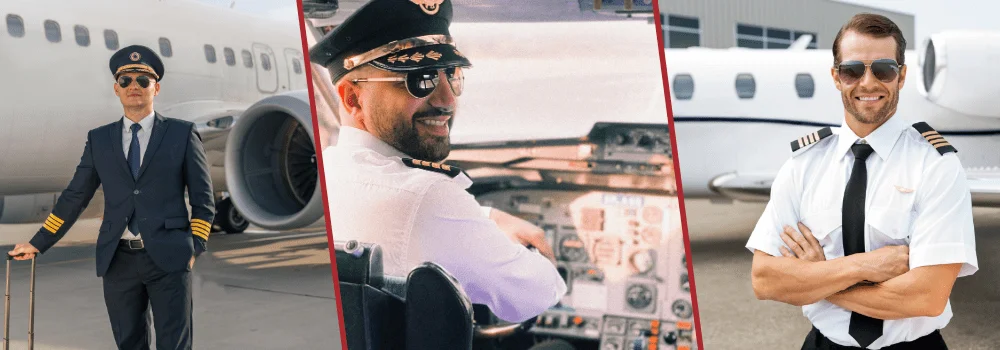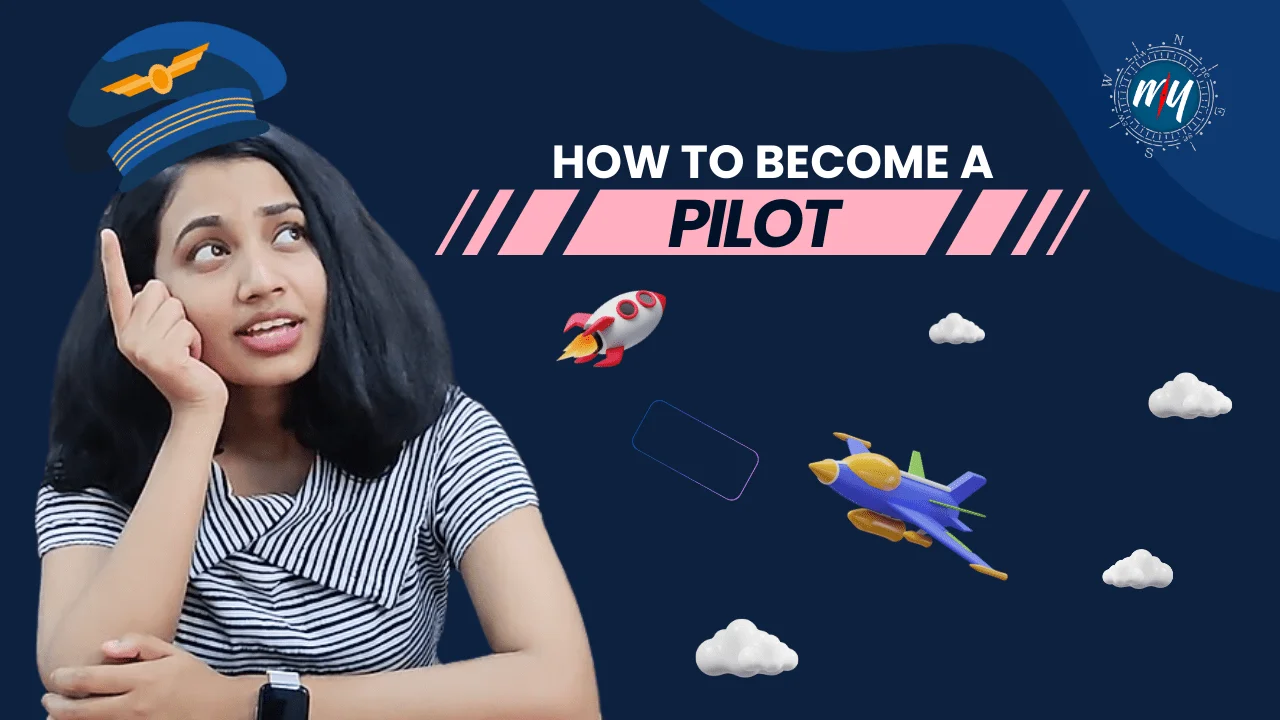How to Become a Pilot?
Discover the step-by-step process to become a pilot after 12th commerce, the eligibility criteria, and the career opportunities that await you

In this Career Outline

Introduction to Pilot
"To most people, the sky is the limit. To those who love aviation, the sky is home."- Jerry Crawford
A Pilot is a trained professional who operates an airplane. They handle travel planning, perform maintenance checks, and ensure the aircraft is flight-ready by inspecting engines and systems. If issues arise, they document them and schedule maintenance. Pilots also verify fuel levels for the journey and communicate with air traffic control for clearance. During flight, they use onboard communication systems to manage heading, and altitude, and monitor subsystems and fuel supply.
Steps to Become a Pilot:
Step-1
There are various types of pilots, such as commercial airline pilots, private pilots, and military pilots. Start by determining which career path best aligns with your passion and long-term goals.
Step-2
To gain the necessary flying experience, enrolling in an accredited flight school is essential. You will receive both theoretical and practical training to establish a strong foundation as a pilot.
Step-3
Before flying solo, you’ll need to obtain a Student Pilot License (SPL). To get this, you must be at least 16 years old and pass a basic medical examination and written test.
Step-4
After completing flight training and passing an exam, you’ll receive your Private Pilot License (PPL). With this license, you can fly small aircraft for non-commercial purposes.
Step-5
Building up your flight hours is a critical step in becoming a professional pilot. For commercial pilots, you will need at least 200 hours of flight experience.
Step-6
With sufficient flight hours, the next step is to obtain a Commercial Pilot License (CPL), which allows you to fly for airlines or charter companies. You'll also need to pass theoretical exams and medical tests.
Step-7
Once you've earned your CPL, it's time to apply for positions with airlines or other aviation companies. Even as a working pilot, you’ll need to continue training to stay up-to-date with industry regulations and aircraft technology.
Eligibility Criteria
| Eligibility Criteria | Description |
|---|---|
| Eligibility | Must possess at least 50% aggregate marks in 12th grade from a recognized board (PUC/CBSE/ICSE/ISC, etc.). |
| Educational Background | High school diploma or equivalent. |
| Undergraduate Degree | A degree in B.Sc/B.Tech or a Diploma is required. This is the basic qualification needed to pursue a career as a pilot. |
| Postgraduate Degree | An M.Tech in Aviation can be beneficial for pursuing higher education and better career opportunities. |
| Entrance Exams | Must have a valid score in entrance exams such as JEE-Main, KIITEE, SRMJEE, CEE, HITSEE, CET, etc. |
- You need at least 50% aggregate in 12th grade from a recognized board (PUC/CBSE/ICSE/ISC), with a science background required for a science degree. Cut-off marks vary by college.
- A valid score in entrance exams after 12th like JEE-Main, KIITEE, SRMJEE, or state-specific tests is needed. Some colleges offer their own exams if your scores are not sufficient.
- A B.Sc/BTech degree or diploma is required to become a Pilot.
- An M.Tech in Aviation can enhance your qualifications for advanced opportunities.

Not eligible to pursue this career?
Find out different career options based on your current academic accomplishments. Enquire with our career experts and build a roadmap to your career success!
Tasks to perform as a Pilot:
Knowledge & Skills Required
Pilots must possess a wide array of skills to succeed in their careers. Here are the key knowledge areas and skills needed to excel in this field:
| Knowledge Required | |
|---|---|
| Understanding of flight principles and aircraft mechanics | Knowledge of weather patterns and their effect on flight |
| Proficiency in using navigational tools and systems | Knowledge of how to read and operate aircraft instruments |
| Understanding of local and international aviation laws | In-depth knowledge of emergency protocols and safety measures |
| Skills Required | |
|---|---|
| Problem-Solving | Decision Making |
| Stress Management | Communication |
| Leadership | Attention to Detail |
Understanding What are soft skills? and why is it important,as they complement technical abilities and enhance overall performance in the field of Pilot.

The Knowlegde and Skills don't intrigue you?
Your career may not align with your interests. Identify them and match with careers requiring those skills for faster growth and success!
Job roles offered for a Pilot:
Once qualified as a pilot, various career paths open up to you, such as:
Test new or modified aircraft to ensure safety and performance. Many work for the Aviation Administration or military and need strong aviation knowledge and safety awareness.
Begin as an airline pilot with a commercial license. Responsibilities include conducting flights, firefighting, aerial photography, and more. A typical cockpit is manned by two pilots—the captain and the copilot.
Fly private clients, like business leaders or celebrities, often forming personal connections with employers. They work for smaller firms and enjoy more career flexibility.
Ensure aircraft safety by inspecting planes, air traffic systems, and procedures, recommending repairs and upgrades.
Oversee airport airfields, ensuring safe takeoffs and landings, maintaining navigation systems, and coordinating with air traffic control to meet safety standards.

Not sure where you fit in?
With countless career options, choosing the right path can be tough. Analysis and guidance sessions help clarify what to study, pursue, and achieve.
Career Opportunities for a Pilot:
Pilots can opt for various fields of work in the companies listed below:
| IndiGo | Spicejet | Air India |
| Jazz Aviation | First Student | Air Asia |
| Air India | CACI International Inc |
Colleges offering courses for Pilot:
Here is the list of colleges offering the Best courses after 12th:
| School of Business, University of Petroleum and Energy Studies, Dehradun | School of Management, Dr DY Patil University, Navi Mumbai |
| HITS Chennai - Hindustan Institute of Technology and Science | SJES College of Management Studies, Bangalore |
| International Institute for Aerospace Engineering and Management, Jain University, Bangalore | Indian Institute of Knowledge Management, Chennai |
| Nehru College of Aeronautics and Applied Sciences, Coimbatore | Institute of Clinical Research India, Ahmedabad |
| Avalon Business School, Visakhapatnam |
End Note
Starting on the journey to become a pilot is both challenging and rewarding. Whether you aim to fly commercial jets or small private planes, this career promises adventure, responsibility, and a unique perspective on the world. If you’re ready to take the leap, SetMyCareer is here to guide you through Career counselling after graduation at every step of the way. Connect with our experts and set your sights on the skies!
In this Career Outline
You don't fit in as a Pilot?
Find out your best suitable career by booking an appointment with our experts
Book nowGet In Touch
No. 14/595, 1st Floor, Nanjappa Reddy Layout, Koramangala 8th Block, Bangalore 560095






